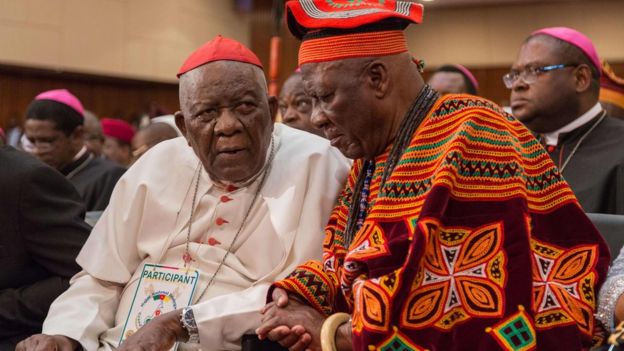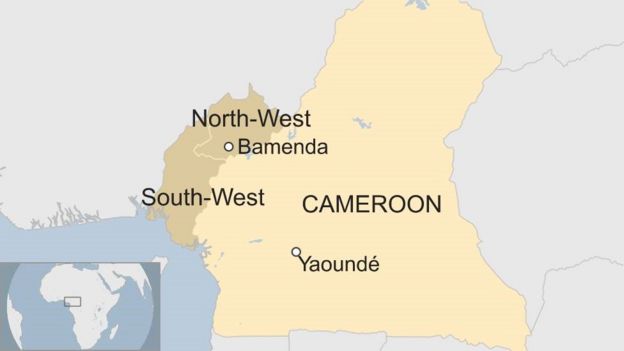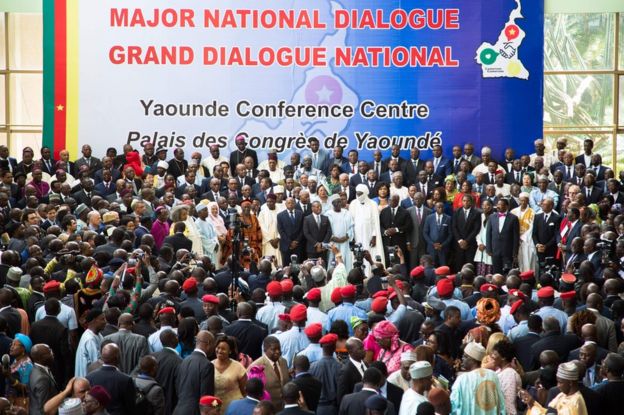7, October 2019
BEN MUNA: A TRIBUTE TO A COLOSSUS GONE HOME IN DIRE TIME OF NEED 0
The phone call from my dear sister and friend Bibiana Taku once more announced the sad news of the death of Ben Muna. This phone call announcing the death of Ben Muna, replicated in some regards, that which announced the death of my friend Bate Besong which is a painful loss from which I have never recovered.
Some months ago, Ben Muna and our distinguished colleague Paul Chiy flew in from London to the Hague to discuss important professional matters with Karim Khan QC and me. The contributions of Ben Muna in that profound professional discussion will remain indelible in my memory.
I have known Ben Muna for so many years. Barely four years in my professional career, I contested and was elected a member of the council of the Cameroon Bar Association. Ben Muna was the President of the Bar Council then. Shortly on being elected, I became his close partner in several battles for the enthronement of the rule of law and a just social order.
We fought against the politicization of justice and the militarization of constitutional rights that was imposed on the citizenry by a power cartel of power mongers. Ben was a passionate advocate of justice with a human conscience and mobilized lawyers and the citizenry to join him in this crusade.
Ben led a delegation of lawyers to the biannual conference of the African Bar Association in Abuja Nigeria in 1991, where Chief MKO Abiola presented the keynote address. My distinguished learned colleagues Chief Eta Besong Jr, Mrs M.N Weledji, Peter Monthe Tumnde, Mrs Helen Ebai, Charles Eno, and many others were in the delegation.
There, African lawyers gathered in that conference witnessed the leadership skills of Ben Muna. In a potentially tense election battle that was about to erupt, Ben took the microphone and urged the attendees, “learned colleagues, why this pushyfooting? Why not give Mr Charles Idehen the President of the NBA a mandate to move this great continental association to higher heights?”. There was an acclamation and Roger Chamba the Hon Attorney General of Zambia who was the outgoing President, after consultation, reconvened and the choice of Ben was endorsed by a near majority as the President of the NBA. My late friend Kamni Ishola Isobu remarked to me the end of the day’s proceedings that Ben Muna was, indeed, a great lawyer capable of providing the type of continental leadership that Chief Abiola had advocated in his keynote address.
When we last met in Stockholm last year, the first time since the African Bar Association Conference in 1991, Hon. Roger Chamba and I recalled the memorable intervention of Ben Muna in that conference. It is regrettable that several attempts to reunite Ben and Charles Idehen did not materialize because of the bad telephone network communication.
Ben led us to valiantly defend the erstwhile President of the Cameroon Bar Council Yondo Black and the venerable Albert Mukong and others before a court-martial in Yaoundé Cameroun, for asserting a constitutional right to pluralist democratic governance. From thence, I forged an enduring alliance with Albert Mukong for the struggle for freedom and human dignity leading to the creation of the Human Rights Defence Group.
Ben mobilized lawyers and human rights defenders to defend my friend Puis Njawe and Celestin Monga whose only crime was the publication of articles exposing and condemning the endemic corruption that has destroyed the economic and moral foundation of Cameroun. Through this and other cases, Ben provided the platform for the establishment of civil society advocacy in the fight to liberate the people from the bondage and abuses of dictatorial political brigandage. In this regard, the fearless legal luminary provided unprecedented leadership in the fight for justice and civil liberties that permeated his national and international law career.
By the verdict of fate and destiny, we met again at the International Tribunal for Rwanda in Arusha where he was the Deputy Prosecutor and I was a Lead Counsel for one of the accused persons. I found myself alone on the defence bench while Ben, Carla Deponte and five other Prosecutors were on the prosecution bench to argue an interlocutory appeal, I filed before the Appeals Chamber of the ICTR. I stood my ground and responded to the alternate submissions by all the members of the prosecution team. At the close of the session, Ben moved across to me and we briefly laughed at the fact that Ben was back where he began his law career as a Prosecutor. Persons present watched as we discussed courteously and pleasantly only a few minutes after we were subjected to intense legal combat with ammunitions provided on both side by the very erudite judge Shahabuddin now of blessed memory and his four colleagues in the panel. Little did they know that although a prosecutor, Ben was indeed, a champion of fair trial rights for accused persons before the courts.
Ben ended his time on earth, defending largely abducted victims of atrocity crimes and the arrogance of power before a court-martial. His memorable prophetic submissions will inform the conscience of a nation at battle with its soul about the consequences of trivializing human rights, human dignity and politicization of justice. The enduring consequences of these violations may never be reversed. But no one will ever say that Ben Muna the prophetic voice of reason and the conscience of true justice did not caution and provide an opportunity for the abatement of the madness that has led to the collapse of an imposed house of cards.
May the justice of the Lord, the Guarantor of true justice and all life, grant him a place of choice in God’s heavenly kingdom
May his soul rest in peace.
By Chief Charles A. Taku













 @AsstSecStateAF This is an encouraging first step toward peaceful dialogue in the Southwest and Northwest regions of #Cameroon https://twitter.com/afp/status/1179832992048435200 … AFP news agency
@AsstSecStateAF This is an encouraging first step toward peaceful dialogue in the Southwest and Northwest regions of #Cameroon https://twitter.com/afp/status/1179832992048435200 … AFP news agency 
















7, October 2019
Biya declares National dialogue ‘success’, Ambazonians doubtful 0
Cameroon’s president Paul Biya on Friday praised this week’s national dialogue, saying a series of recommendations had been published, including the equality of English and French speakers, giving greater autonomy to the provinces and offering amnesty to fighters who down arms.
The dialogue “afforded you the opportunity to reaffirm once more your attachment to peace and concord in your country,” Biya said in a tweet addressing the people. “I would like to congratulate and thank you very sincerely for that.”
The government hoped that the talks, which closed on Friday, would open the door to a historic peace agreement, ending a fight between the army and English-speaking militias seeking to form a breakaway state called Ambazonia.
The conflict has cost nearly 2,000 lives, forced half a million people to flee and presented President Paul Biya with his biggest threat in nearly 40 years of rule.
What did the government offer?
Biya, who is 86 years old, said on Tuesday that he would drop charges against 333 prisoners held in relation to the crisis, but the move failed to appease separatists and moderates alike who say that thousands more remain imprisoned on trumped-up charges.
On Thursday, delegates at the Grand Dialogue recommended the adoption of a “special status” for the two regions where most of the country’s English-speaking minority (16%) live.
The special status, if approved by the central government, would grant them greater financial autonomy, the possibility of electing their local governors previously appointed by the executive, and the restoration of a house of traditional chiefs in these two regions.
The prime minister, Joseph Dion Ngut, who chaired the dialogue, described it as “a success (…) because it found interesting and permanent solutions to the problems most Cameroonians” were raising.
Several moderate Anglophones, in favour of a return to federalism and not in favour of the secession demanded by the radical ones, cautiously effectively welcomed the recommendation.
“This special status is just a first step towards finding a permanent solution to this crisis”, the famous Anglophone human rights lawyer Felix Agbor Nkongho told the AFP.
Its application, which requires a constitutional amendment, “could have a strong symbolic value in the minds and attitudes of those who wanted a return to federalism,” says Cameroonian researcher Edouard Epiphane Yogo of the Bureau des Etudes Stratégiques in Yaoundé.
“It would be a victory for those who absolutely wanted federalism, and a victory for those who wanted decentralization,” he says.
Critics say it is ‘not enough’
However, “the war is not over,” says English-speaking activist Ayah Ayah Ayah Abine, who believes that “only negotiation between the two sides can put an end to the war.
“After the thousands of lives wasted by the radicalization of both sides, something really special would be needed to end this conflict,” he added, arguing that Yaoundé‘s proposed status for the English-speaking regions is “only a combination of words that does not cover anything specific.
The dialogue was boycotted by key leaders of the separatist movement.
“The inhabitants of Ambazonia do not need a special status. We are not part of Cameroon,” Ebenezer Akwanga, leader of one of the separatist armed groups told AFP.
“Ambazonia is marching towards freedom and nothing can stop us,” he added.
For Chris Anu, the independence leader, this proposed special status is almost an insult:
“Do they suggest that we are a handicap?”, he asks, before asserting: “Nothing less than total independence for the people of the Southern Cameroons (another name for the English-speaking state wanted by the independentists), and there is no way to discuss it”.
Critics say the talks this week were not inclusive and did not involve any discussion about a return to federalism that many say is the solution to the conflict.
“Cameroon is a joke,” said Cho Ayaba, a leading member of the Ambazonian Governing Council. “Let me be absolutely clear: no Ambazonian is and will be part of Cameroon’s charade.”
Former opposition presidential candidate Akere Muna was told at the talks that the people allowed to speak at one session had already been identified and that he would not be able to participate.
“I said to myself, but that’s not a dialogue,” Muna told Reuters. “It’s a show and I’m a spectator. I left.”
Roots of the conflict
The roots of their grievances go back a century to the League of Nations’ decision to split the former German colony of Kamerun between the allied French and British victors at the end of World War One.
For 10 years after the French- and English-speaking regions joined together in 1961, the country was a federation in which the Anglophone regions largely governed themselves. Biya’s centralisation push after he came to power in 1982 quickly eroded any remaining Anglophone autonomy.
The insurgency emerged after a heavy-handed government crackdown on peaceful protests late in 2016 in the Anglophone Northwest and Southwest regions by lawyers and teachers who complained of being marginalised by the French-speaking majority.
Within months of the initial 2016 protests, newly-formed armed groups were attacking army posts in the Anglophone regions. The army responded by burning down villages and shooting civilians.
Once vibrant cities, including the technology hub of Buea, have turned into ghost towns. Most schools have closed; villages have emptied out as people flee into Nigeria.
Separatists entrenched in the mountainous west say they will only come to the table if the government releases all political prisoners, including 10 leaders who were sentenced in August to life in prison on terrorism charges, and withdraws the military from the two English-speaking regions.
“When we want to bring peace, it is generally the symbols that count, the symbol is not the number” of detainees released “but rather the quality” of those who are released,” warns Yogo.
Source: Agencies